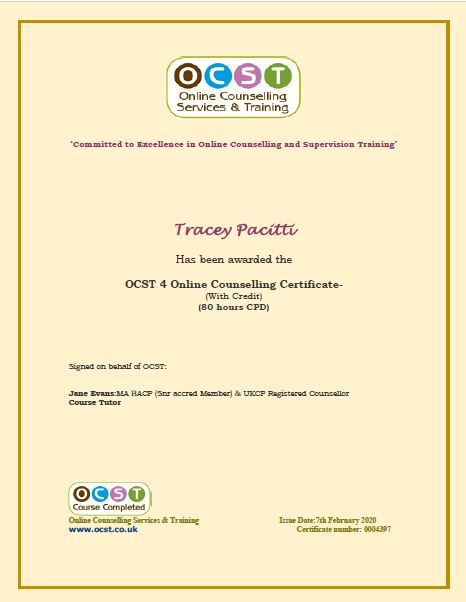
Face to face counselling is probably what most clients are familiar with when they seek out counselling. However, in these uncertain times when we are facing a global Coronavirus pandemic, it is good to know that there are other options available that enable you to begin, or continue, your counselling journey – whether that is because you are are self-isolating or endeavouring to minimise contact with others.
Benefits to Online Counselling
There are many benefits to online counselling –
- Affordable appointments: I offer online appointments at £55 for a 50 minute appointment for individuals or £70 for couples counselling
- Accessibility: I’m able to offer additional slots to online clients and can offer specific methods to those with visual or hearing impairments
- No childcare or parking costs: There’s no need for you to worry about childcare or parking costs when you receive counselling from the privacy of your own home
- Flexible appointments: Your appointment times can be flexed to accommodate your personal commitments
- Anonymity: If you are worried about others knowing you are having counselling then you can begin your counselling journey in privacy. If you also want to remain anonymous from me then you can choose email, instant chat or telephone counselling
Email Counselling
Email Counselling involves the client writing about their issues in an email and then, at an agreed time, the client then receives, from me, a therapeutic response to their email.
Many clients, and many studies, find that taking time to type problems and issues is a particularly effective way to make sense of what they are experiencing. Most of us usually type slower than we talk and this extra time enables us to process our thoughts, issues and emotions more effectively.
An additional benefit with email counselling is that you, as the client, can write your email whenever your issues are on your mind. You don’t have to try and ‘hold that thought’ as you might with a face to face appointment that is scheduled for some days away.
What to expect with email counselling
As you might imagine, counselling via email takes place in emails that are exchanged between client and therapist.
But before we might settle into a regular rhythm of therapeutic correspondence, we will set up a safe structure within which we will work.
This will involve:
- Sending you an online contract and confidentiality statement
- Sending you a cancellation policy
- Confirming the fees for each email reply
- Clarifying with you your reasons for seeking counselling at this time and the goals you have for your therapy
- Clarity from me as to the time-frame in which I will respond
- Making lots of space for you to ask as many questions as you need to
Video or webcam counselling
This is probably the most popular form of online counselling; I ‘meet’ all my clients online using Whereby by sending them an email with a link in advance of their appointment time. It is suitable for both couples and individuals. There is no software to download
What to expect with video counselling
Clients who want to be able to see and interact with a therapist would most likely find this method of most benefit.
If you choose this method, like with the email counselling, we would set up a safe structure first (see what to expect with email counselling above). Then, at your chosen appointment time, you would simply click on a link that had been sent to you, ensuring your laptop or tablet camera is on, along with your microphone/audio and you would then be connected to me in a live session.
Clients who choose Webcam or video counselling would need to ensure they had a good internet connection and were able to settle themselves in a private space where they would not be disturbed or overheard.
Telephone counselling
This is exactly as it sounds; talking sessions are conducted over the phone between the client and therapist. It’s not suitable for couples. Clients with internet connectivity issues, or for those preferring anonymity, may prefer this method.
I’m a qualified online therapist
It’s really important to ensure that your chosen therapist is qualified to offer online therapies.
While online counselling is not yet regulated, the Association for Counselling and Therapy Online (ACTO) is an association for counsellors and therapists working online. ACTO “promotes, maintains, improves and advances online counselling and psychotherapy as a recognised method of therapeutic delivery within the mental health professions.”
I am a member of ACTO and hold a post-grad diploma in online counselling – I’m also on the registered list of practitioners with both BACP and COSCA.




